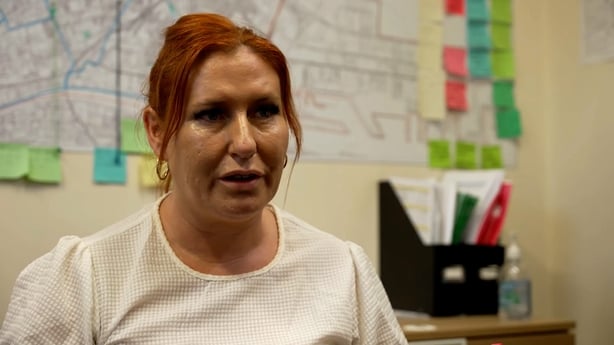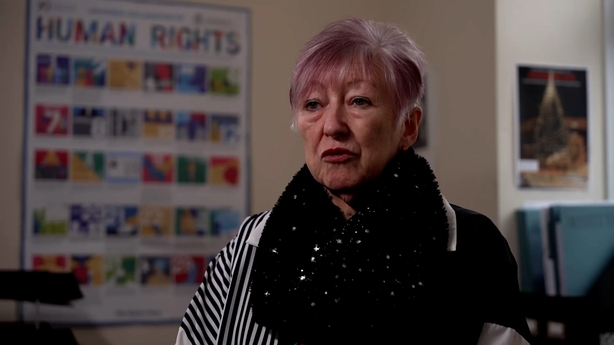Community workers and politicians in Dublin's north inner-city area are concerned that some parents from migrant backgrounds have been reluctant to send their children back to school following the Parnell Square school knife attack last week.
"Some of the children from migrant backgrounds haven't returned to school. They're genuinely terrified," local TD Gary Gannon told Prime Time.
"The community is still traumatised from the events of last week, still trying to put words to the fact that three children and a person they know was viciously assaulted. We still haven't had time to deal with that trauma."
There is a feeling that the horrendous knife attack was overshadowed by the riots, looting and disturbances that followed in Dublin last Thursday night.
Mr Gannon said the narrative around the three schoolchildren and a childcare worker being "viciously attacked" was "lost to one about the far right, to one about the rioters and tasers".
"The basic questions of how their children can be safe have yet to be answered and that's causing huge anger," Mr Gannon said.

Paula Kearney, Community Development Office in the Inner-City Organisation Network (ICON), told Prime Time that as a mother, "it must be really painful to think your child was sent to school and something like this happened to them".
"It must be painful as well to see that such a horrific thing happening to your child and that being used to create hate," Ms Kearney said, in relation to the riot that followed the attack, later that day.
"It's a double-edged sword there. Your child's already really sick in hospital and then the incident [that] happened to your child has been used to divide whole communities."
Language and labels
Ms Kearney also criticised some politicians and members of the media for the language they have used in relation to those involved in the rioting.
During Leaders' Questions in the Dáil on Wednesday, Minister for Justice Helen McEntee called people involved "scumbags" and "thugs".
Yesterday morning, Minister McEntee said the words were a "reflection of the actions" of last week. "It was perhaps not language that I would normally use," she said.
Independent Senator Lynn Ruane has also taken issue with the use of such words.
Senator Ruane said such language can further alienate people in disadvantaged communities such as the north inner city. These sentiments were echoed by Ms Kearney.
"A lot of people who got involved in what happened last Thursday after it were just young people who've seen an opportunity, who feel that their voices are never heard, who come from communities that they feel are constantly being left behind. And that's not condoning what they've done, 100% it's not," Ms Kearney said.
Ms Kearney said it is important to have an understanding of the people involved, and not just condemn them. She said the minister’s use of such language feeds into a negative stereotype.
She said: "When you're looking at the media and you're seeing the minister and all again referring to young people as thugs, using this language that the media have used over and over again about this community and the young people in it, that's going to feed into it and you're always going to get that reaction. If you're always going to treat people in that way and look at them as less than."
Ms Kearney argued that "there's a huge air of classism as well in how the Government are speaking about this community and what happened last week".
The effect of that is that people who are not from the community are "going to look on this community as 'we're all just scum, we don't deserve the supports that we get’ and that's not true at all".

Now in her early 70s, Bernie Walsh has spent most of her life as a community worker in the north inner city. She is retired now but still involved in several groups in the area, which is one of the most diverse in the country.
Ms Walsh said the northeast inner city is a very diverse area compared to other areas of country, with 42% of its residents non-Irish born.
"That's not a problem if you have the services to go with that. I live on a road. It's completely mixed now, I think of eight or nine different nationalities. It's wonderful … but really, I suppose what we see in this area, there aren't enough things provided for the new communities coming in," she said.
Ms Walsh said that her community has been left "numb" by what happened last week and she is apprehensive about the future fallout.
"I have a terrible fear that this will be the start of something that you'll get reprisal groups on other side. We have a lot of young people, we have a lot of young migrant people. I'd hate to think that they could be utilised in the same way that our young people were. So, there's a fear around that, definitely," Ms Walsh said.
Ms Walsh also pointed out there is an assumption that it was all young people from her area involved in the rioting and looting last week "where in actual fact, if you look at the addresses of the people that were arrested, they were older people, and they weren't all from the north-east inner city anyway".
Speaking on Prime Time last night, Roderic O'Gorman, the Minister for Children, Equality, Disability, Integration and Youth, said that the Government is currently funding a range of initiatives for young people through the North East Inner City funding programme.
"We have to be careful in what we say."
— RTÉ Prime Time (@RTE_PrimeTime) November 30, 2023
Minister for Children @rodericogorman says some of the language used to describe those involved in last week's riots reflects an anger about what happened on Dublin's streets.
WATCH: #rtept | @RTENews pic.twitter.com/a41qhAoubZ
For the teachers, parents and children at Gaelscoil Choláiste Mhuire on Parnell Square, they are now working to restore normality.
Describing the school, Mr Gannon said it "is a perfect embodiment of the city of Dublin as a whole".
"There's people from all over the city, both people that live very locally, people that travel in to get access to a Gaelscoil.
"And there's people from migrant backgrounds who have chosen to have their children educated through the Irish language. It's a real fusion of the city."
The hope is that the school can return to normal. And be an example for the entire city.





